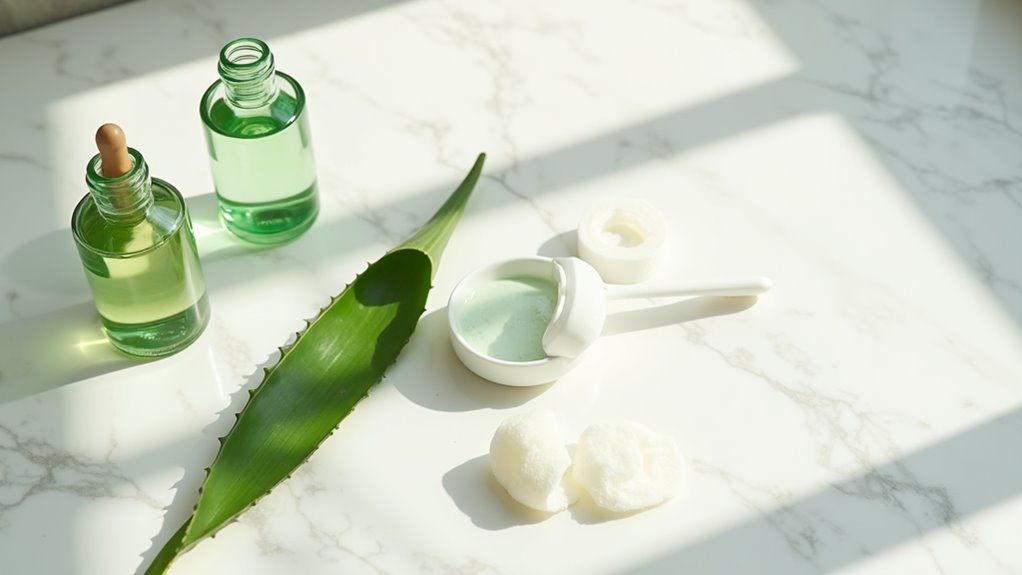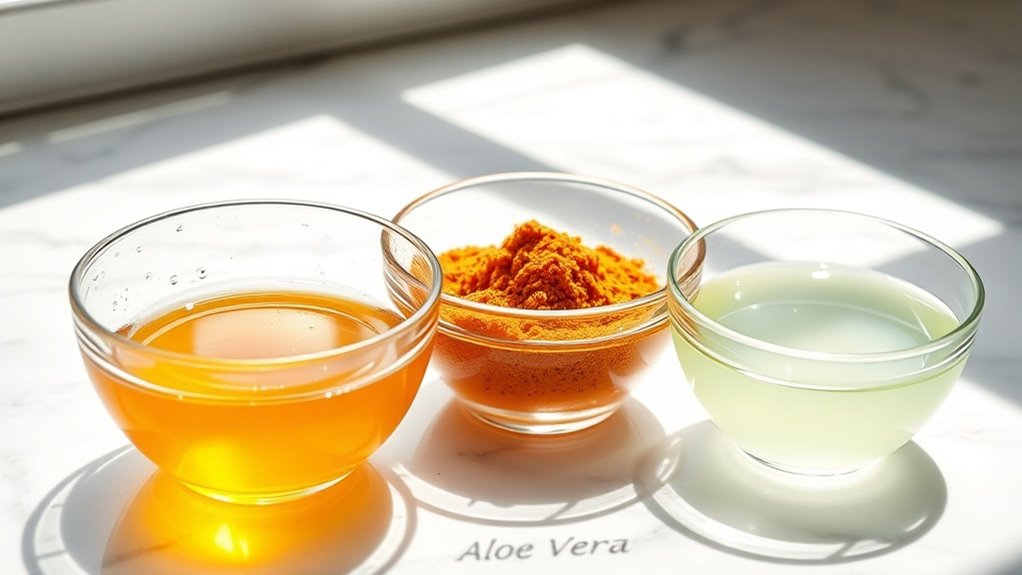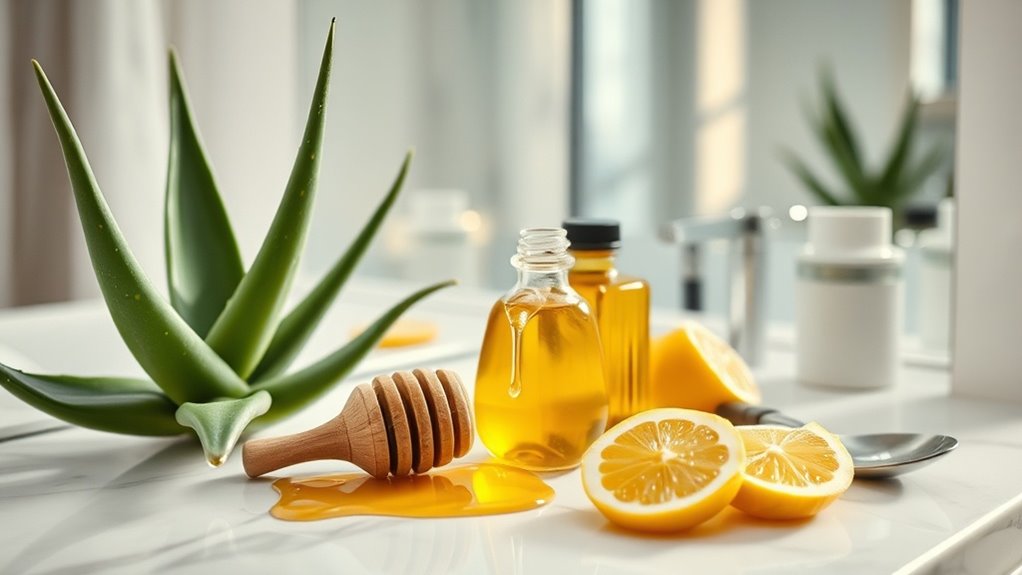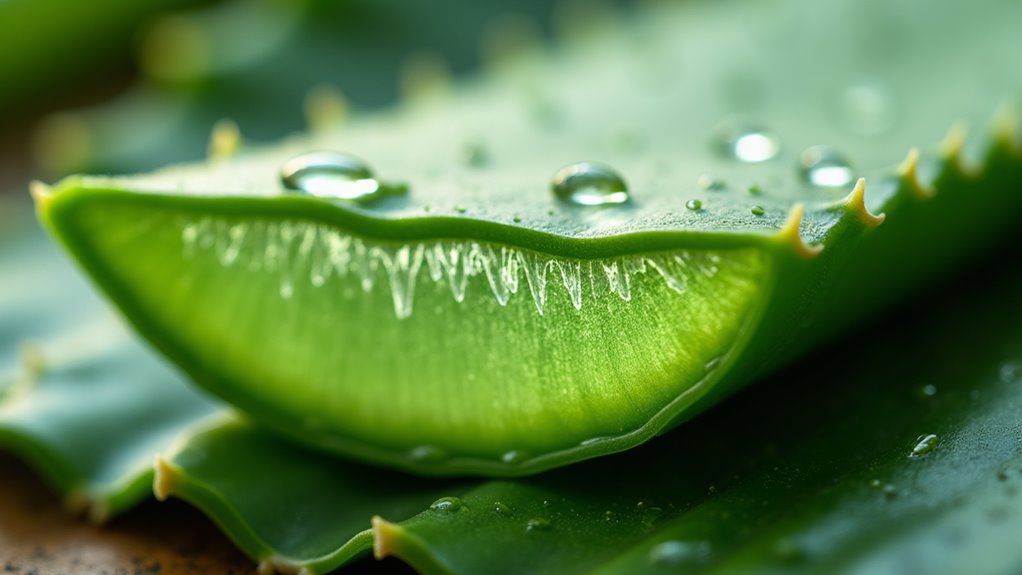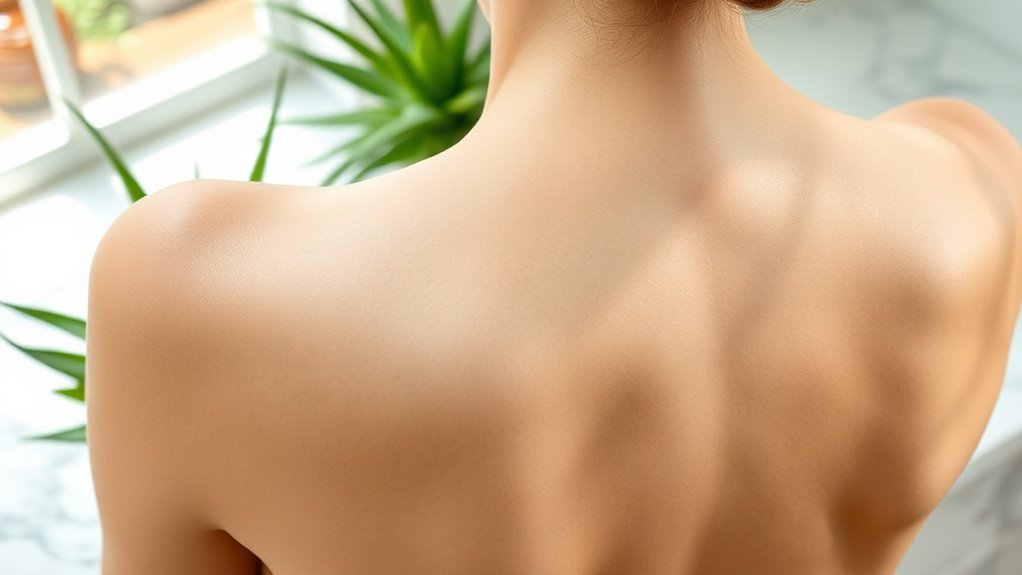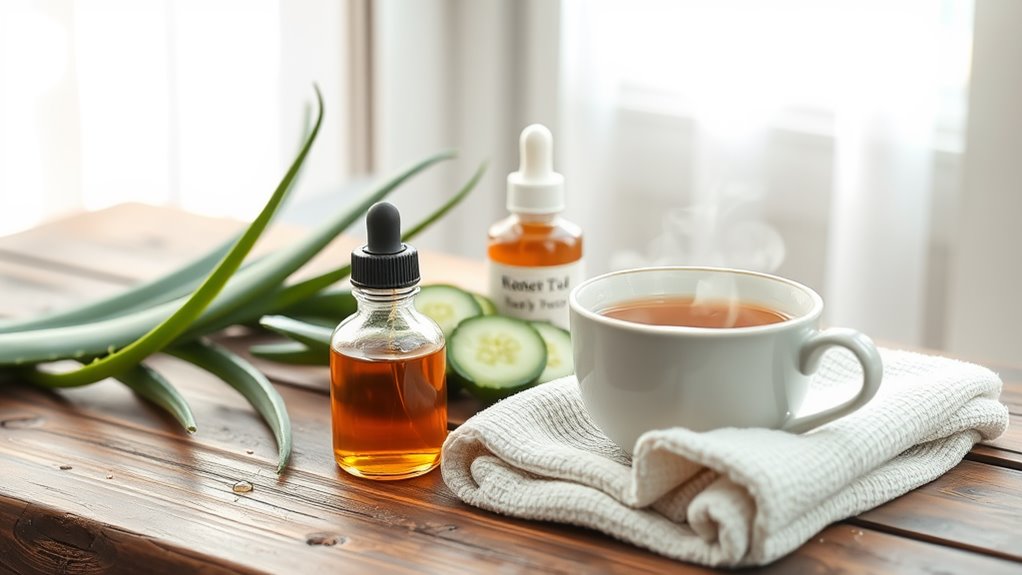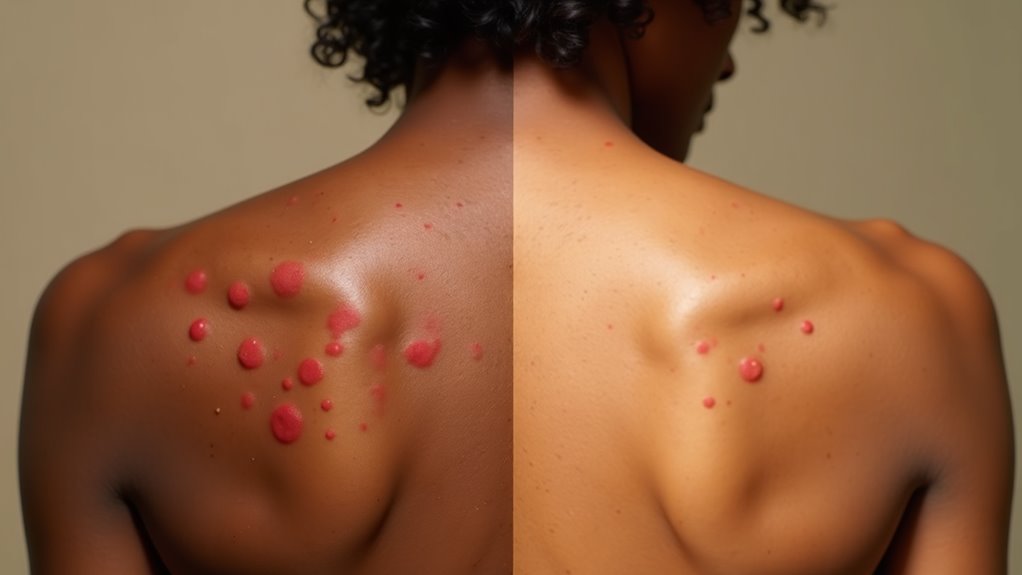My Go-To Acne Remedies That Work Every Time
Your most effective acne solutions combine proven active ingredients with consistent care habits. Start with a gentle cleanser containing salicylic acid or benzoyl peroxide, followed by targeted spot treatments. Natural remedies like tea tree oil and honey offer antimicrobial benefits, while changing pillowcases weekly prevents bacterial buildup. Pair these treatments with a balanced diet low in refined sugars and dairy. Discover how these science-backed strategies can transform your skin health.
Understanding What Causes Breakouts
Acne develops when hair follicles become clogged with oil, dead skin cells, and bacteria. You’ll experience breakouts when your sebaceous glands produce excess sebum, which combines with dead skin cells to block pores.
This creates an environment where acne-causing bacteria thrive.
Several factors trigger these breakouts: hormonal changes, stress, diet, and certain medications. While you might search for pimple remedies overnight, it’s essential to understand that consistent skincare matters more than quick fixes.
Touching your face frequently, using pore-clogging products, and poor hygiene can also contribute to acne formation.
The Science Behind Effective Acne Treatment
While treating breakouts may seem complex, successful acne management relies on three key mechanisms: reducing excess oil production, preventing dead skin cell accumulation, and eliminating P. acnes bacteria.
Your skin’s response to treatment depends on how effectively you target these mechanisms. Ingredients like salicylic acid dissolve excess oil and clear pores, while retinoids regulate cell turnover to prevent clogging.
Benzoyl peroxide creates an oxygen-rich environment that kills acne-causing bacteria. When you combine these active ingredients strategically, you’ll address multiple factors simultaneously, leading to clearer skin and fewer breakouts.
Natural Remedies From Your Kitchen
When you’re seeking natural acne solutions, your kitchen likely contains several scientifically-supported remedies that can help clear your skin.
Studies show that tea tree oil masks, apple cider vinegar treatments, and honey-cinnamon combinations contain antimicrobial properties that may reduce acne-causing bacteria.
You’ll find these ingredients are readily accessible, cost-effective alternatives to commercial products, though they should be patch-tested before full application to prevent potential skin reactions.
Tea Tree Oil Mask
Tea tree oil’s potent antimicrobial properties make it an effective natural treatment for acne-prone skin. The oil’s terpinen-4-ol compound reduces inflammation and kills acne-causing bacteria.
To create an effective mask, mix 3 drops of tea tree essential oil with 2 tablespoons of raw honey. Apply the mixture to clean skin and leave it on for 15 minutes. Rinse thoroughly with lukewarm water.
Don’t exceed the recommended oil concentration, as higher amounts can irritate your skin. If you’re new to tea tree oil, perform a patch test 24 hours before full application.
Use this mask twice weekly for optimal results.
Apple Cider Vinegar Treatment
Apple cider vinegar’s natural alpha-hydroxy acids and antimicrobial properties can help balance your skin’s pH levels and reduce acne-causing bacteria.
To create an effective treatment, mix one part raw, unfiltered apple cider vinegar with three parts filtered water.
Apply this diluted solution to your face using a cotton ball after cleansing. Let it sit for 5-10 minutes, then rinse thoroughly with cool water.
If you have sensitive skin, increase the dilution ratio to 1:4. Use this treatment once daily, preferably in the evening.
Don’t skip the dilution step, as undiluted vinegar can irritate your skin and cause chemical burns.
Honey and Cinnamon
Both honey and cinnamon contain powerful antimicrobial and anti-inflammatory compounds that can effectively combat acne-causing bacteria.
To create this remedy, mix one tablespoon of raw honey with 1/4 teaspoon of Ceylon cinnamon into a smooth paste. Apply the mixture directly to your clean face or spot-treat specific blemishes.
Let it sit for 10-15 minutes before rinsing with lukewarm water.
You’ll get the best results using Manuka honey, which has proven antibacterial properties, and Ceylon cinnamon, which contains higher levels of beneficial compounds than Cassia cinnamon.
Use this mask 2-3 times weekly for optimal results.
Essential Oils That Combat Pimples
Among the most effective natural treatments for acne, essential oils have gained significant clinical recognition due to their antimicrobial and anti-inflammatory properties.
You’ll find particularly promising results when using tea tree, lavender, and rosemary oils to target persistent breakouts and reduce skin inflammation.
-
Tea tree oil contains terpinen-4-ol, which effectively kills P. acnes bacteria while reducing redness.
-
Lavender oil’s linalool and linalyl acetate compounds help balance oil production and promote skin healing.
-
Rosemary oil’s carnosic acid offers potent antioxidant properties that protect against free radical damage.
Always dilute these oils with a carrier oil before applying them to your skin.
Like coconut oil treatment, these essential oils work by disrupting harmful microorganism cell membranes to prevent their growth and spread.
Overnight Spot Treatments That Actually Work
While essential oils offer natural acne-fighting benefits, targeted overnight spot treatments provide concentrated solutions for stubborn blemishes.
The most effective ingredients include benzoyl peroxide (2.5-10%), which kills acne-causing bacteria, and salicylic acid (0.5-2%), which unclogs pores and reduces inflammation.
You’ll find maximum results by applying a thin layer of treatment directly on the pimple before bed.
Look for products containing additional ingredients like niacinamide to control oil production or sulfur to dry out spots. For sensitive skin, try gentler options with tea tree oil or zinc oxide.
These treatments typically show visible improvement within 24-48 hours.
Skincare Habits for Preventing Future Breakouts
If you’re looking to prevent future acne breakouts, start by changing your pillowcase weekly to reduce bacterial buildup that can transfer to your skin.
Managing your daily stress levels through meditation, exercise, or other relaxation techniques can help regulate hormones that trigger breakouts.
Using gentle, pH-balanced cleansers instead of harsh soaps will maintain your skin barrier’s integrity while effectively removing dirt and oil.
Consider switching to silk or bamboo pillowcases which provide antimicrobial properties and better moisture control for your skin while you sleep.
Clean Pillowcases Every Week
Changing your pillowcase weekly plays a crucial role in preventing acne breakouts, as these fabrics accumulate dead skin cells, bacteria, and oil residue during sleep.
Clean pillowcases help maintain clear skin by reducing contact with these acne-triggering substances that build up over time.
- Use hypoallergenic, breathable cotton pillowcases that won’t trap excess heat and moisture
- Wash pillowcases in hot water (130°F/54°C minimum) with fragrance-free detergent to eliminate bacteria
- Consider keeping multiple pillowcases on hand to ensure you’re always sleeping on a clean surface
If you can’t change pillowcases weekly, place a clean towel over your pillow nightly as a temporary solution.
Manage Daily Stress Levels
Because stress triggers increased cortisol production, managing your daily stress levels plays a vital role in preventing acne flare-ups.
High cortisol levels stimulate your sebaceous glands to produce excess oil, leading to clogged pores and breakouts.
Incorporate stress-reducing activities into your daily routine:
- practice deep breathing exercises for 5-10 minutes,
- engage in regular physical activity,
- get 7-8 hours of quality sleep, and
- try meditation or yoga.
If you’re experiencing chronic stress, consider speaking with a mental health professional.
These evidence-based strategies can help regulate your cortisol levels, resulting in clearer, healthier skin.
Stick to Gentle Cleansers
While managing stress helps control acne internally, selecting the right cleanser forms the foundation of effective external skincare. Choose non-comedogenic, fragrance-free cleansers that maintain your skin’s natural pH balance and protective barrier.
-
Look for gentle ingredients like glycerin, ceramides, or hyaluronic acid that clean without stripping essential moisture.
-
Avoid harsh sulfates, alcohol, and exfoliating beads that can irritate acne-prone skin and trigger excess oil production.
-
Cleanse twice daily using lukewarm water and gentle circular motions – excessive washing or hot water can worsen breakouts.
Remember to patch test new cleansers on a small area first.
Diet Changes for Clearer Skin
Recent scientific evidence suggests that dietary modifications can significantly impact acne severity and skin health.
You’ll want to reduce your intake of high-glycemic foods, as they can trigger insulin spikes that increase sebum production. Cut back on dairy products, particularly skim milk, which contains hormones that may worsen acne.
Instead, focus on consuming omega-3 rich foods like salmon and flaxseeds, which help reduce inflammation.
Add zinc-rich foods such as pumpkin seeds and lean meats to support skin healing.
Include antioxidant-rich fruits and vegetables, particularly those high in vitamins A and C, to promote skin repair and collagen production.
Best Over-the-Counter Products
The most effective over-the-counter acne treatments contain active ingredients like benzoyl peroxide, salicylic acid, or alpha-hydroxy acids. These ingredients work by targeting different aspects of acne formation, from killing bacteria to unclogging pores and reducing inflammation.
-
Benzoyl peroxide (2.5% to 10%) eliminates P. acnes bacteria and helps prevent new breakouts, but can cause dryness.
-
Salicylic acid (0.5% to 2%) exfoliates inside pores and reduces sebum production.
-
Alpha-hydroxy acids, like glycolic acid (5% to 10%), remove dead skin cells and improve skin texture.
Start with lower concentrations to minimize irritation.
You’ll typically see results within 4-8 weeks of consistent use.
When to See a Dermatologist
If you’re experiencing deep, painful cysts, widespread breakouts, or acne that leaves scars, you should schedule an appointment with a dermatologist immediately.
You’ll also want to consult a skin specialist when over-the-counter treatments haven’t improved your acne after 12 weeks of consistent use.
A dermatologist can evaluate your specific condition and prescribe stronger medications, including oral antibiotics or isotretinoin, that aren’t available without a prescription.
Severe Symptoms Need Attention
While over-the-counter treatments can manage mild to moderate acne, certain symptoms signal the need for professional intervention. If you’re experiencing severe symptoms, don’t wait to consult a dermatologist, as delayed treatment can lead to permanent scarring and emotional distress.
-
Deep, painful nodules or cysts that persist for weeks and don’t respond to traditional treatments
-
Widespread inflammatory acne covering large areas of your face, chest, or back
-
Significant scarring, including ice-pick scars or raised keloid formations
These symptoms often require prescription medications like isotretinoin or oral antibiotics, which only dermatologists can prescribe and monitor effectively.
When Home Remedies Fail
Beyond severe symptoms, recognizing when home remedies aren’t producing results becomes a clear indicator for seeking professional help. If you’ve consistently tried over-the-counter treatments for 8-12 weeks without improvement, it’s time to consult a dermatologist.
| Signs to See a Dermatologist | Action Steps |
|---|---|
| Persistent cysts | Schedule appointment within 2 weeks |
| Scarring begins | Seek immediate consultation |
| No improvement after 3 months | Request medical evaluation |
| Emotional distress | Consider psychological impact |
Your dermatologist can prescribe stronger treatments like oral antibiotics, isotretinoin, or hormone therapy. They’ll also evaluate underlying medical conditions that might be triggering your acne, ensuring a more targeted and effective treatment approach.
Building Your Anti-Acne Routine
Developing an effective anti-acne routine requires careful consideration of your skin type and specific acne concerns. Establish a consistent morning and evening regimen that incorporates gentle cleansing, targeted treatments, and non-comedogenic moisturizers.
-
Start with a pH-balanced cleanser containing salicylic acid or benzoyl peroxide to remove excess oil and bacteria without disrupting your skin barrier.
-
Apply treatment products containing retinoids, niacinamide, or alpha-hydroxy acids to address active breakouts and prevent new ones.
-
Finish with an oil-free moisturizer and broad-spectrum SPF during daytime to protect treated skin and maintain hydration.
Always introduce new products gradually to monitor your skin’s response.

